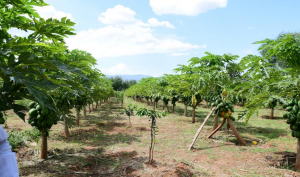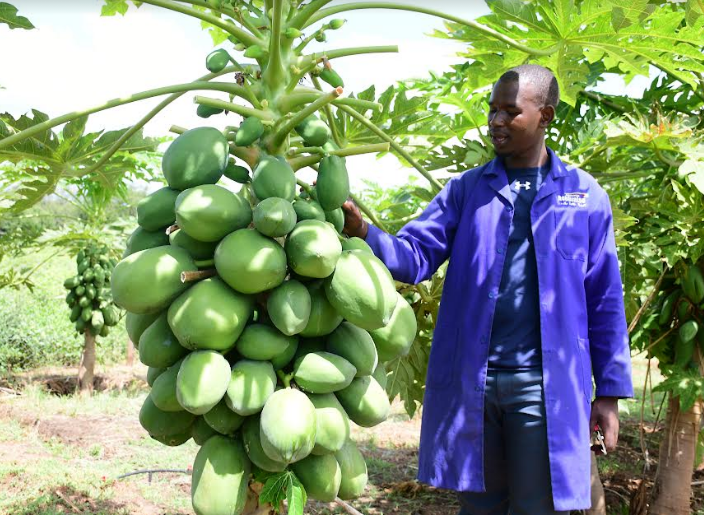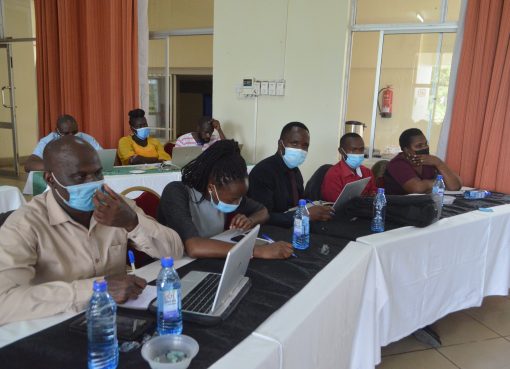After Eli Kimaiyo graduated from Chuka University in 2023, he already knew what he wanted to do while the majority of his fellow graduands were still trying to figure out what to do.
Others are preparing their CVs and dropping them from one office to another in search of the elusive white collar jobs; Kimaiyo has hit the ground running, literary.
The 28-year-old Economics and Mathematics graduate says he has always loved farming, having grown up in rural areas. He grew up seeing his father grow various types of fruits, including citrus and mangoes, which normally do well in the Kerio Valley.
Kimaiyo, who has already planted 2,000 pawpaw trees to date, says he started planting paw paws while still in college, though he was planting the traditional variety, which helped him meet his day-to-day expenses as the parents paid school fees.

“Therefore, when I graduated, I knew what I wanted to do and embarked on it immediately,” he said.
The youth say agriculture has always been the backbone of the Kenyan economy, which means that there is high potential in the sector as people need to eat, but unfortunately most youth have abandoned it, leaving it to the elderly.
Kimaiyo, who comes from Biretwo in Keiyo South subcounty, says for one to engage in agriculture, the key resources needed are land, water, seeds, and the knowledge of both the market and the type of farming one wants to engage in. “While money is also important, one doesn’t require huge capital if the above are available,” he said.
He says before he decided he wanted to undertake commercial pawpaw farming, he did his due diligence. Luck was on his side, as the area is conducive for pawpaw farming, and being passionate about agriculture worked for him.
Having gone to school, he knew how to break even; he had to adopt to new ways of farming where he had to look for certified seeds and varieties which are popular in the market and which produce more compared to the traditional varieties.
He says he went for hybrid seeds, which take between 6-7 months before the first harvest, adding that one tree can produce between 80 to 90 kgs.
Kimaiyo says farmers avoid selling one pawpaw and instead sell in kilogrammemes, with each kilogramme going for Sh.40, and therefore one tree can give him up to Sh.3,600.
Knowledge about how to plant, the spacing, and when to plant is key. According to Kimaiyo, one should start preparing the farm one month prior to the rainy season and ensure that there is water for irrigation just in case the rains stop before the plants have enough water to sustain their growth.
He added that once one buys the seeds, they are taken to a seed bed, where they take two months before they can be transplanted with a spacing of 4 by 2 meters for maximum production.
Kimaiyo says that pawpaws are prone to various fungal diseases and attacks by pests which feed on the flowers and even the fruit itself, and therefore it is important for one to check on them daily to know when to spray them, adding that it is important to keep the farm clean through weeding.
For one to succeed in farming, he said, one should be hands-on, saying delegation of duties should be minimal.
Kimaiyo says he loves being in the farm and passionately describes the serenity he experiences just walking around and admiring the paws as they grow.
“I spend about 16 hours daily in the farm just walking around. This enables me to keep the farm clean, know when to spray, and generally manage the farm,” he said.
He said the farm has kept him quite busy, such that he has no time to visit the local trading centre to play pool, which is common among people his age, adding that he has never applied for any job.
The youth says, if he ever gets a white collar job, he would consider so many things before accepting the offer, citing the expenses like rent, transport, and salary he would get, adding that he cannot imagine changing the farm environment, which he says is so friendly to the office environment.
On his future plans, Kimaiyo says he wants to have expanded his farm in the next five years to deal with large-scale production of pawpaws, adding that he wants to engage in value addition where he can start producing pawpaw juice and other products.
“I have seen a factory which produces mango crisps right here in the Kerio Valley; who knows, I might also start pawpaw crisps too,” he said.
On his education, Kimaiyo says though he is yet to use his certificate to look for a job, he applies what he learnt in managing his pawpaw farm. “As an economist, I know that I should minimise the cost of production and maximise profits for my business to break even,” he said.
This he does by ensuring that he gets what is effective but cheap in his farm. He says instead of buying inorganic fertiliser, he uses goat manure, which he says is easily and cheaply available given that most people in the area rear goats.
He adds that, apart from being cheap, organic fertiliser is friendly to the environment and healthier for the soils.
He continues that he prefers hiring farmhands to cultivate his shamba, which is one acre, instead of spending more money hiring a tractor, saying a tractor will come in handy once he embarks on large-scale farming.
Kimaiyo says he also uses his knowledge of mathematics to calculate the expenses used in his farm and what he earns so that he can know whether he is making losses or profit, and therefore his education is still valuable.
He, however, says to keep abreast of the ever-changing farming practices, he attends agricultural extension demonstrations in addition to visiting the internet.
He advises the youth to consider farming instead of waiting for white collar jobs, saying one can create jobs through agriculture. Kimaiyo says land is a very important resource, saying it was sad that people were selling their land to seek jobs abroad.
He said even in semi-arid areas considered deserts like the Kerio Valley can be quite productive. “Look at my farm; who would think that this is Kerio Valley?” he poses.
By Alice Wanjiru




